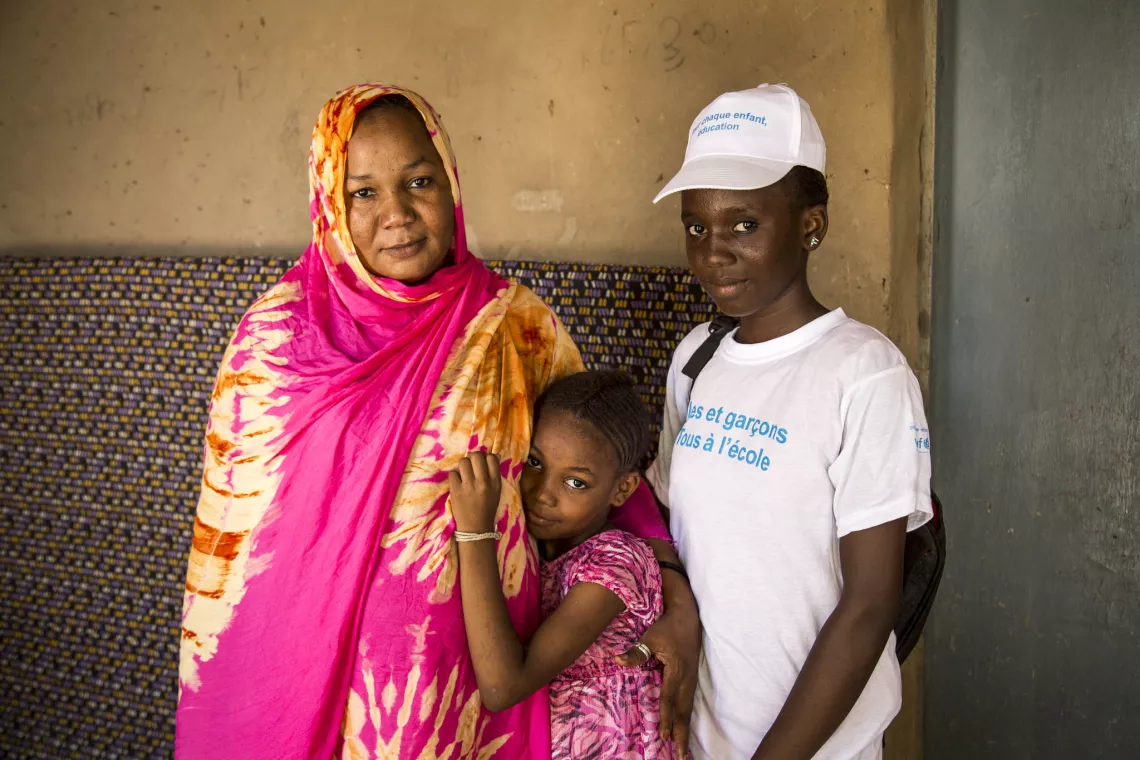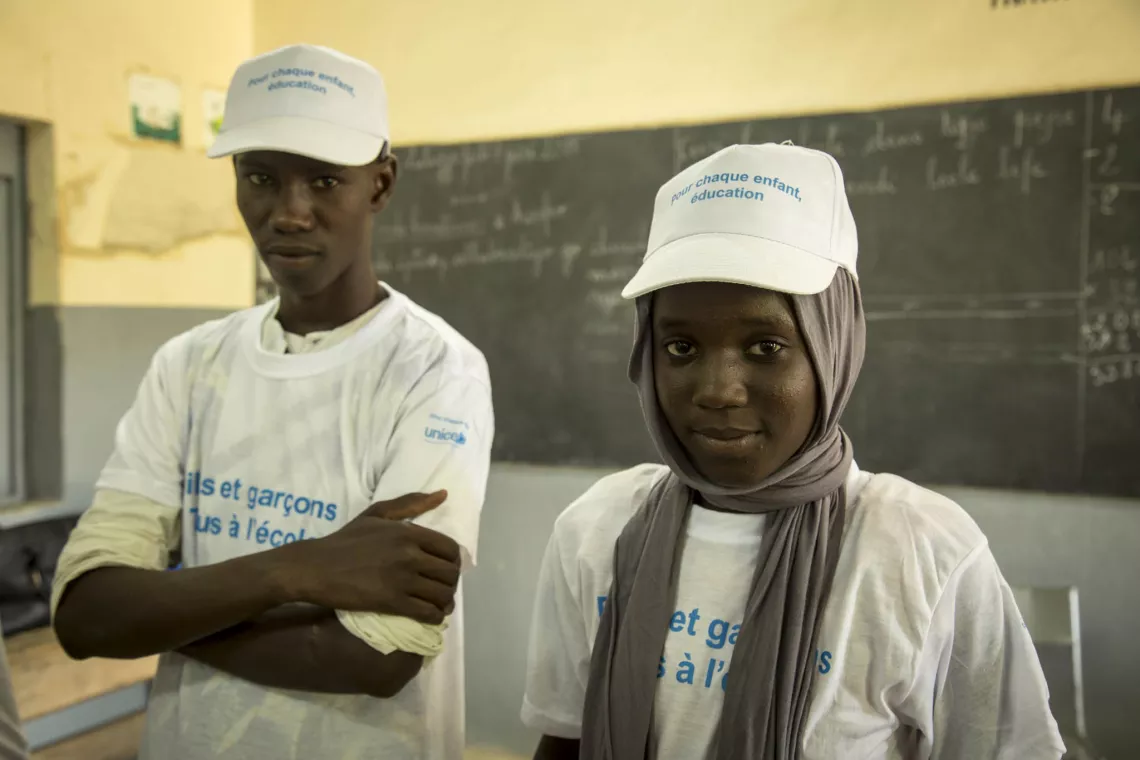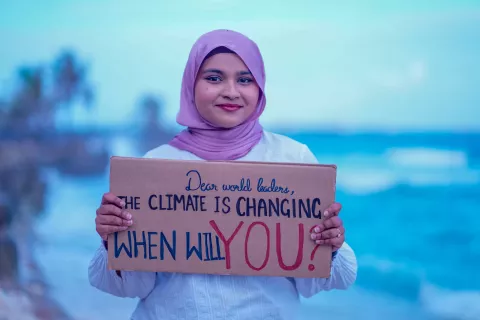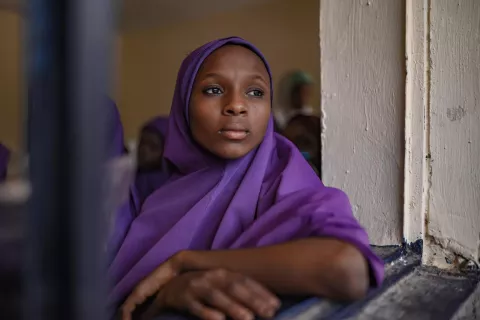Hear my voice: Children advocating for the right to learn
In Mali, Back-to-School Child Ambassadors are braving all odds to promote education.

- Available in:
- English
- 中文
TIMBUKTU, Mali – Fatoumata Touré was born and raised in Timbuktu, the ancient city in central Mali once renowned as a centre of Islamic scholarship. Like her ancestors, Fatoumata loves to learn. “My favourite class at school is history and Timbuktu has so many stories to tell!” the 14-year-old says. She dreams of becoming a lawyer.
A passion for intellectual pursuits – and service – clearly runs in her veins; Fatoumata’s parents are both teachers in Timbuktu, and her oldest brother is a history and geography teacher in the capital city of Bamako.
But many of Fatoumata’s peers aren’t so fortunate, and their path to school isn’t so clear. Over one million children – nearly one-third – of primary school age are out of school in Mali. In 2017, the rate of secondary school-aged children who were out of school was over 60%.
Children face a myriad of challenges in their quest to get an education: child labour, child marriage, lack of quality schools close to home and a deteriorating security situation which has forced over 700 schools to shut. Transportation and logistics pose another hurdle: to reach her school, Fatoumata must walk an hour each way, every day.
As a female in Mali, Fatoumata is at even higher risk of dropout than boys.

Children offer the solution
In 2018, with support from Norway, Denmark and the Republic of Korea, UNICEF substantially expanded its Back-to-School Child Ambassador training programme in Mali. For the 2018-2019 school year, UNICEF and its partners in Mali have trained more than 3,800 children and young people nationwide to become leaders in their communities and fight for every child’s right to an education. In an effort to strengthen gender equality, UNICEF trained as many girls as boys to become Child Ambassadors. Fatoumata is one of them.
As children prepare to return to school after the summer holiday, these ambassadors are trained to talk to their peers and their parents about the importance of education. They learn key messages on the benefits of education, how to talk about the added value of education to unconvinced parents, and how to track out-of-school children with the help of an interview guide.
After the UNICEF-supported trainings, ambassadors return to their communities and go door-to-door to speak to parents about the importance of sending their children to school. They go on partner radio stations, talking about the value of education. They ensure the voices of children are included in community meetings.
The ambassadors share one common goal: to get as many Malian children as possible back in the classroom.

Carrying the torch
When asked why she became a UNICEF Back-to-School Child Ambassador, Fatoumata says it’s because of the many children in the streets.
“There are many children who don’t go to school in Timbuktu,” she says. “Often their parents don’t have the means to send them to school or they lack motivation.”
“In Timbuktu, there are 12 schools: five private and seven public. The public schools are free! This is what I often try to tell the parents and their children when I do home visits.”
Fatoumata estimates she visited around 50 families before the 2018/19 schoolyear began. “I think I was successful with 20 of them, but there are a lot of obstacles,” she says.
Old traditions and education
Far from Timbuktu, in the western region of Kayes, Fatoumata’s fellow Ambassador Naminata Sanogo, is conducting a home visit in Kéniéba.
While the regions may be separated by more than 1,500 kilometres, the barriers facing children in Naminata’s home are just as daunting.
“Many girls in Kayes are victims of child marriage,” the 17-year-old says. Most families hold onto cultural beliefs that a girl’s role is as wife and mother, not as student or professional.
“One in two girls are married before the age of 18! These child marriages are one of the root causes of school dropout. I am trying to make parents understand that a girl’s place is in school and not at home,” Naminata explains.

Natural barriers and education
Overcoming logistical challenges is part of being a Back-to-School Child Ambassador. Alou Keïta, 11, is an ambassador in Mopti, a town at the confluence of the Niger and Bani rivers. As political instability causes insecurity in Mopti to rise, school dropout is rapidly increasing. True to his commitment, Alou often takes non-conventional means of transportation, including a dugout, to meet families whose children are out of school.
“Nothing will prevent me from telling my friends about the importance of education,” the boy says. “In a dugout, on a motorbike, on foot or through a discussion on the radio, I will do everything to get the message out to parents to send their children to school. My vision is zero children on the street and all children in school!”
For their future
“Parents teach their kids to go to school,” Fatoumata says. “Teachers teach the kids at school. I am teacher and student at the same time.”
From Timbuktu to Kidal, over Mopti and all the way to Kayes, Fatoumata, Naminata, Alou and their fellow ambassadors are slowly transforming mentalities in the pursuit for a better future for them and their country.
Their efforts mean children’s voices are being heard in decisions that will impact their own futures.



